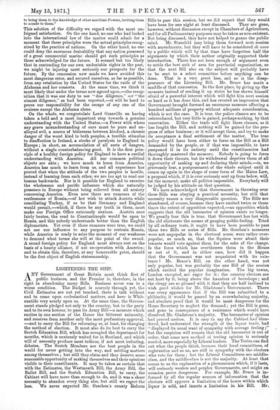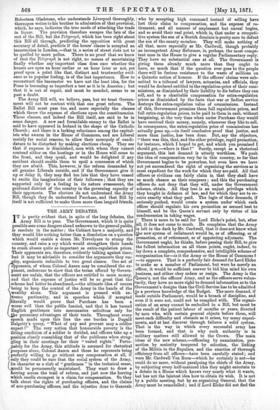LIGHTENING THE SHIP.
ANY Government of Great Britain must think first of public business, and the Premier is, therefore, in the right in abandoning many Bills. Business never was in a worse condition. The Budget is scarcely through yet, the Civil Estimates are not yet touched, there is talk without end to come upon ecclesiastical matters, and here is Whit- suntide very nearly upon us. At the same time, the Govern- ment stands pledged not only to the country, but to the party and to its own honour, to pass its Army Bill—a measure which excites in one section of the House the bitterest animosity, and receives from another only the most perfunctory approval, —and to carry the Bill for reforming or, at least, for changing the method of election. It must also do its best to carry the Scotch Education Bill, which has occupied the department for months, which is anxiously waited for in Scotland, and which will of necessity produce most tedious, if not most irritating, debates. The Scotch Members are the best people in the world for never getting into the way, and settling matters among themselves ; but still they claim and they deserve some reasonable opportunity of making themselves and their opinions visible to their constituents. It may be taken as certain that with the Estimates, the Westmeath Bill, the Army Bill, the Ballot Bill, and the Scotch Education Bill, to carry, the Cabinet will have more than enough to do, and it was a sheer necessity to abandon every thing else, but still we regret the loss. We never expected Mr. Goschen's county Reform
Bills to pass this session, but we did expect that they would
have been for one night at least discussed. They are gone, however, without discussion except in Chambers of Agriculture, and for all Parliamentary purposes may be taken as non-existent. Not being discussed, they have not helped to guano the public mind. Mr. Stansfeld may bring them forward next session with amendments, but they will have to be considered de novo by a public which will by that time have forgotten half the arguments by which their author originally supported their introduction. There has not been enough of argument even to settle the best unit of area for provincial organization, so that the next Bill also on the subject will probably have to be sent to a select committee before anything can be done. That is a very great loss, and so is the disap- pearance of the Licensing Bill. Mr. Bruce has made a muddle of that concession. In the first place, by giving up the measure instead of sending it up stairs he has shown himself afraid of a powerful interest which will fight him next session as hard as it has done this, and has created an impression that Government brought forward an enormous measure affecting a hundred millions of property without adequate consideration, which is not the case. It is true, the police clauses are to be reintroduced, but very little is gained, perhaps nothing, by that reservation. Either the trade will fight these clauses, as it has fought the Bill, and nothing will be gained for the pro- gress of other business ; or it will accept them, and try to make its acceptance a final settlement of the matter. The true policy would have been either to force on the Bill as a Bill demanded by the people, or if that was impossible, to have postponed it in its entirety until the constituencies had thoroughly mastered the measure. Nobody is going to force it down their throats, but its withdrawal deprives them of all opportunity of making up and declaring their minds,—is, we grievously fear, a postponement of the whole subject until it comes up again in the shape of some form of the Maine Law, a proposal which, if it is ever seriously sent up from below, will, for the moment, make all politics impossible. Everybody will be judged by his attitude on that question. We have acknowledged that Government in throwing over these Bills was obeying a practical necessity, but still that necessity rouses a very disagreeable question. The Bills are abandoned, of course, because they have excited twice or three times the extent of opposition expected,—an opposition which suggests that the old barometer of opinion exists no longer. We greatly fear this is true, that Government has lost with the old electorate the means of gauging public feeling. Tried by all ordinary tests, it ought to have been possible to pass these two Bills or series of Bills. Mr. Goschen's measures were not unpopular in the electoral sense, were rather over- popular, so much so, that the Squires were afraid their tenants would vote against them for the sake of the change. Is the force which has overthrown them in the House or out of it, and in either case, how did it happen that the Government was not acquainted with its exis- tence? Mr. Bruce's Bill, on the other hand, was not only popular, but was probably the one Bill of the session which excited the popular imagination. The big towns, London excepted, are eager for it ; the country electors are not hurt by it, being above the haunters of beershops ; and the clergy are so pleased with it that they are half inclined to wish good wishes for Mr. Gladstone's Government. There was every appearance that if the Bill was submitted to a plebiscite, it would be passed by an overwhelming majority, and absolute proof that it would be most dangerous for the Home Secretary to neglect the demand ; yet the Bill is gone, and gone in consequence of a resistance which would have dissolved Mr. Gladstone's majority. The barometer of opinion had proved useless. It is easy to say the Cabinet had blun- dered, had underrated the strength of the liquor trade, had "displayed its usual want of sympathy with average feeling ;" but the suspicion will remain that the old barometer is out of order, that some new method of testing opinion is seriously needed, more especially by Liberal leaders. The Tories can find out what the people think, because their local committees, of registration and so on, are still in sympathy with the electors who vote for them ; but the Liberal Committees are middle- class, and the middle-class is not the majority. At least that seems to us the explanation of a phenomenon which, if it lasts, will seriously weaken and perplex Governments, and might On occasion prove dangerous. For example, Mr. Bruce is in- formed by all the regular sources of information that the electors will approve a limitation of the hours within which liquor is sold, and inserts a limitation in his Bill. Mr.
Robertson Gladstone, who understands Liverpool thoroughly, thereupon writes to his brother in admiration of that provision, which, he says, indicates the true mode-of attacking the trade in liquor. The provision therefore escapes the fate of the rest of the Bill, but the Telegraph, which has been right about this Bill all through, predicting the opposition with great accuracy of detail, predicts if the hours' clause is accepted an insurrection in London,—that is, a series of street riots not to be quelled by mere police. There is no proof that we know of that the Telegraph is not right, no means of ascertaining finally whether any important class does care whether the houses are open an hour earlier or an hour later or not, yet proof upon a point like that, distinct and trustworthy evid- ence as to popular feeling, is of the last importance. How to reconstruct the barometer we have not the least idea, for the Press is becoming as imperfect a test as it is in America ; but that it is out of repair, and must be mended, seems to us past a doubt.
The Army Bill will, we believe, pass, but we trust Govern- ment will not be content with that one great reform. The Ballot Bill must pass too, and more especially the clauses which throw the expense of elections upon the constituencies. Those clauses, and indeed the Bill itself, are said to be in some danger. A new and formidable enemy to the Ballot is said to have appeared in Ireland in the shape of the Catholic Church ; and there is a lurking reluctance among the capital- ists who swarm in the House of Commons, and are Liberal mainly for social reasons, to allow their monopoly of candi- dature to be disturbed by making elections cheap. They see that if expense is diminished, men with whom they cannot contend either on the hustings or in the House will come to the front, and they quail, and would be delighted if any accident should enable them to spoil a concession of which they are afraid. This, however, is the reform demanded by all genuine Liberals outside, and if the Government give it up or delay it, they may find too late that they have ceased to excite the imaginations of their followers ; that they are supported only by a feeling in its nature evanescent, the profound distrust of the country in the governing capacity of their opponents. The electors do not understand the Army Bill, though they do understand Purchase, and that Bill by itself is not sufficient to make them more than languid friends.



































 Previous page
Previous page